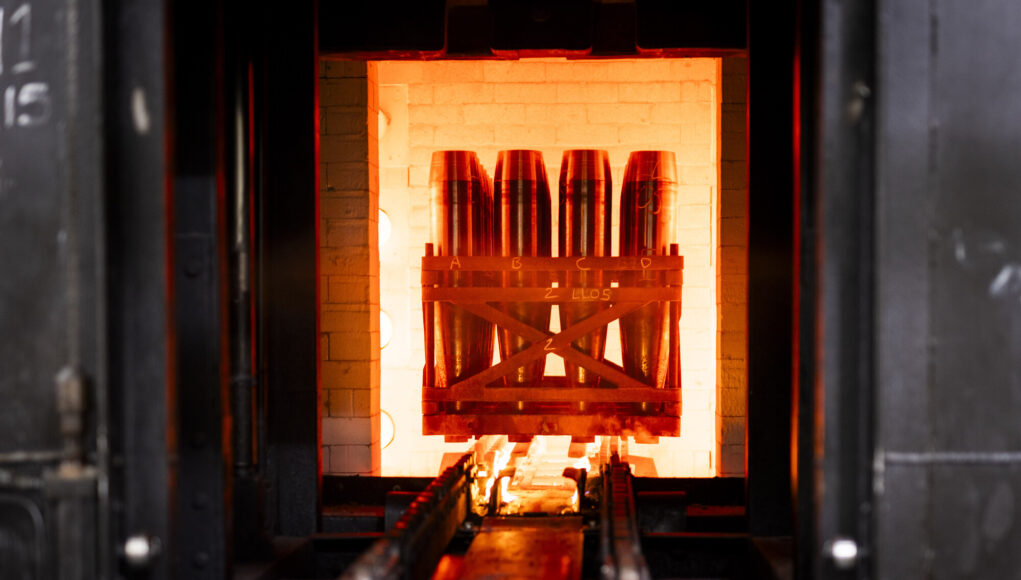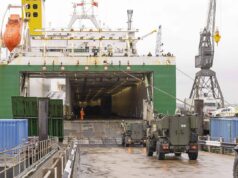BAE Systems has announced a significant leap forward in munitions manufacturing, unveiling new methods that are expected to enhance the UK’s strategic supply chain resilience and increase artillery production capacity exponentially.
Following over £150 million of investment in its UK munitions facilities since 2022, BAE says the developments will “deliver a sixteen-fold increase in production capacity of 155mm artillery shells” when its new explosive filling facility at Glascoed, South Wales, becomes operational this summer.
In addition to that, the company has invested £8.5 million in advanced manufacturing research over the past five years, leading to what it calls “significant breakthroughs in the creation of next generation explosives and propellants.”
A key element of the new production approach is continuous flow processing—a method that allows the synthesis of explosive material without relying on Nitrocellulose and Nitroglycerine. These materials are currently under pressure globally due to heightened demand, particularly in light of the ongoing war in Ukraine.
According to BAE Systems, this will enable the UK to “produce sufficient explosives and propellants in the UK to meet UK Ministry of Defence and export requirements,” with industrial-scale capacity expected by the end of 2026.
Steve Cardew, Business Development Director at BAE Systems’ Maritime and Land Defence Solutions, said: “Our leap forward in synthetic energetics and propellant manufacture will strengthen the UK’s supply chain resilience and support our ramp up of critical munitions production to meet growing demand in response to the increasingly uncertain world we’re living in.”
He added that the new methods also “support economic growth through high-skilled jobs and potential export opportunities.”
BAE has already piloted the breakthrough, demonstrating that small node-based production of explosives is feasible. The technology eliminates the need for a large-scale explosive factory, offering a safer and more cost-effective way of manufacturing propellant.
The company states the new processes are “intended to require lower investment and would offer greatly reduced running costs,” while also improving safety by keeping the amount of explosive material in process to a minimum.
As the UK Ministry of Defence’s primary ammunition provider, BAE Systems currently supplies a broad spectrum of munitions—from small arms to artillery—produced at facilities across Cheshire, Monmouthshire, and Tyne and Wear.














Sounds positive! Let’s just hope the new manufacturing technique doesn’t compromise on quality.
Best defence news for ages. Hopefully, Ukraine will benefit quite a bit as well?
Very impressive, mean while in Russia they are using Donkeys and their shells are made by slaves in North Korea.
Always wondered when micro-reactor tach would make it to mainstream production.
Never had the opportunity to play with one, but I always like the idea of using it to produce high-nitrogen content pyrotechnics.
It is great that Britain is back making RDX in the UK again, rather than importing it from France & the USA.
Just need the guns to use it now.
At least this will help to plug the gap from the US betrayal.
As a PhD research chemist….
“ the synthesis of explosive material without relying on Nitrocellulose and Nitroglycerine”
These are both easy to make if you know what you doing and RA used to make them at tonnage scale. There was a factory near the Medway, if memory serves.
Could these mean that the synthesis steps are actually in situ? So they are dynamically made?
“A key element of the new production approach is continuous flow processing”
Ok, making the things that go bang in small quantities is a lot safer – interested to see how consistency is achieved as this can be very hard with flow synthesis particularly if solid and semi solid materials.
Sounds like a very interesting and worthwhile project TBH as it returns sovereignty. We learned the hard way with NLAW charges that other governments have other views. We also need to be self sufficient as we all discovered in COVID it was every country for itself and contracts just get ripped up in times of crisis.
Explosive manufacturing without nitrocellulose is no new. Neither is continuous flow,unless we are back in 1941.
Good news indeed. A 16 fold increase in production capacity is not to be sneezed at.
However, for me the best bit of this technology break seems to be that it is cheaper to create the production facilities in the first place and that they can be smaller than existing plants. That is very good news as it makes it possible to spread significant capacity across a number of smaller sites greatly improving resilience of production.
This could be a game change for the UK and Europe…
Cheers CR
Whilst this is obviously excellent news and necessary in the current circumstances I hope we are also looking at the bulk manufacturing of smarter weapons so that we can deal with any potential enemies’s weapons well before they come into range. Mass production is clearly a focus for the UK but we don’t want to be constrained to a WW1 style battlefield.
Given our previous reliance on foreign explosive sources, this is very welcome news. Thumbs up to BAE!
I wonder if the Americans weapons manufacturers are begining to figure out how much Trump has screwed them over.
Excellent news
300k + shells per year then.
New propellants and explosive production improvements particularly good to see.
Depends what their base point was. As with any company announcement, you need to give it a fair pinch of salt as their will be some creative accounting/numbers going on to boost the share price
Interesting, I wonder if there are also implications to barrel wear? I understand with double base rifle propellants the addition of nitroglycerine increases barrel wear due to a higher burn temperature. So could this mean the possibility of making our 155 barrels last a bit longer??
That’s great. But this sounds like a geometric increase, not exponential.
Sounds like a journo using a word to make it sound exciting. Once upon a time he might have said order of magnitude increase or even a quantum leap. Geometric and exponential are progressions or descriptions of continuous growth, not one off increases. Any change from one number to another can be described either way. It’s only when you continue to make increases that you can mathematically model it as geometric or exponential.
Great news! Especially for South Wales.
As a former employee at bae barrow I’m delighted by the companies contracts worldwide and for the many apprenticeships which will enable the company to continue to relinquish success and to be a world leader for all of our future
Great news.
16 fold increase in production. Distributed production to ensure better damage resilience Vs a single site in Washington county Durham.
What’s not to like? Clearly certainty of supply has now met certainty of demand and funding.
Good news.
We can now get those 200+ RC155 SPGs safe in the knowledge we can keep the big guns fed.
This is explosives. Thats Gloascoed in South Wales.
NGAA should help with resilience and increased production of shell.
If that is accurate and sustainable, and I’m not saying it isn’t, then that is a huge win for the UK but also a huge win for Ukraine if we can really ramp up the numbers of 155mm shells we can send them. I mean when you are used to seeing productivity increases in the single digits percentage wise a sixteen fold increase is quite frankly staggering.
Google pay 500$ per hour my last pay check was $19840 working 10 hours a week online. My younger brother friend has been averaging 22k for months now and he works about 24 hours a week. I cant believe how easy it was once I tried it out.
Just Open This Website……… 𝐖𝐰𝐰.𝐄𝐚𝐫𝐧𝐀𝐩𝐩𝟏.𝐜𝐨𝐦
JOIN US Everybody can earn 250/h Dollar + daily 1K… You can earn from 6000-12000 Dollar a month or even more if you work as a part time job…It’s easy, just follow instructions on this page, read it carefully from start to finish… It’s a flexible job but a good eaning opportunity.tab for more detail thank you……..
check ——-⫸ Www.EarnApp1.Com
JOIN US Everybody can earn 250/h Dollar + daily 1K… You can earn from 6000-12000 Dollar a month or even more if you work as a part time job…It’s easy, just follow instructions on this page, read it carefully from start to finish. It’s a flexible job but a good eaning opportunity.tab for more detail thank you……..
check ——-⫸ Www.EarnApp1.Com
JOIN US Everybody can earn 250/h Dollar + daily 1K… You can earn from 6000-12000 Dollar a month or even more if you work as a part time job…It’s easy, just follow instructions on this page, read it carefully from start to finish… It’s a flexible job but a good eaning opportunity.tab for more detail thank you……..
check ——-⫸ Www.EarnApp1.Com
JOIN US Everybody can earn 250/h Dollar + daily 1K… You can earn from 6000-12000 Dollar a [AE43]month or even more if you work as a part time job…It’s easy, just follow instructions on this page, read it carefully from start to finish… It’s a flexible job but a good eaning opportunity.tab for more detail thank you……..
check ——-⫸ Www.EarnApp1.Com
Only because they tripled the prices.to rob us blind.
Bae is not a British company, nor is it our friend.
Not sure how you have worked that one out when the UK Government holds a Golden share in BAE
Manufacturing under license in Ukraine is both obviously needed and a quick return on investment for BAE Systems shareholders.
The 100 years of support Agreement between UK and Ukraine moves from words to deeds with such mutually beneficial collaboration. A distributed factory approach is well suited to the challenge of UAV and missile threats.
This supports the M777 Artillery production ramp up.
Severely needed, good on this for BAE.
Whilst good news for delivery for Ukraine, is the UK mod also placing orders for own stock?